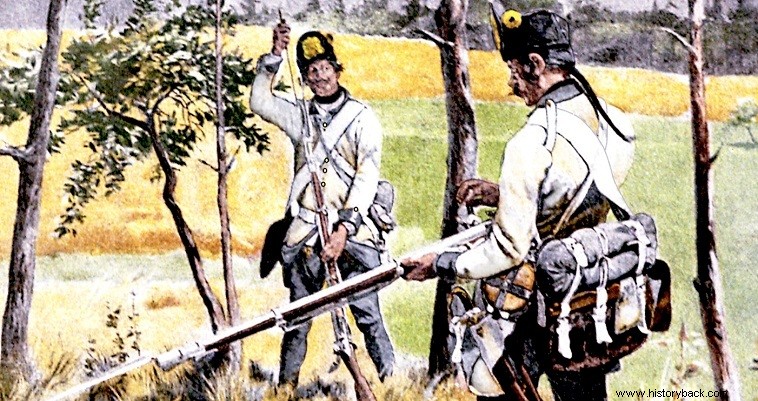
Napoleon was one of the greatest figures in history and military history. The great soldier with the foggy origins, however, was not defeated only at Aspern-Essling (1809), in Russia (1812-13), at Leipzig (1813), or at Waterloo (1815) as is generally believed.
His first defeat came during the Italian campaign of 1796 by the Austrians, whom he himself, however, "dogs" until at least 1809 when they almost crushed him. In the winter of 1796 the situation was not good for the Austrians in northern Italy. The French were besieging Mantua and the Austrians had already twice to "break" the siege.
On November 2, 1796, general Joseph Alvinci, at the head of 28,000 men he crossed the Piave River and moved west with the ultimate goal of lifting the siege of Mantua. At the same time another Austrian force of 18,000 men, under General Davidovich moved south through Trento.
The Austrian army of Marshal Wirmscher was blocked in Mantua , about 24,000 strong. If the siege was "broken", the Austrians would gain a strategic and numerical advantage over the French.
Against the threat Napoleon, commander of the French Army of Italy, ordered the approximately 10,000 strong division of General Vambois to check Davidovich's march, while he sent General Massena's division of about equal strength to control the passage of the Breda River at Bassano.
He kept the Ozero division as his immediate reserve (8,500 men) and a brigade (4,300 men) at Verona under direct command. At the same time, the division of the Irish-born general Kilmaine (~ 9,000 men), continued the blockade of Mantua.
On November 6, Napoleon gathering all his forces decided to attack Alvinci in Basano . In the fierce battle that followed, the Austrians repelled the French attack. The French had 3,000 casualties against the Austrians' 2,800.
At the same time, Davondowicz defeated and routed the opposing French division, inflicting 4,400 casualties against his 3,500. The situation looked ominous for the French. Fortunately for Napoleon, they were saved by the inaction of Davidovich, who believed that the French forces against him were strengthened.
Caldiero
After his defensive victory at Bassano, Alvinci continued his movement. On 11 November his vanguard reached Caldiero, a small town 15 km east of Verona. The commander of the Austrian advance guard Major General Hohenzollern – Ensingen , believing that Verona had been evacuated by the French, advanced thither but was repulsed, finding opposite him the French divisions of Massena and Ozereau.
Austrian losses amounted to 400 dead and wounded. after this Hohenzollern-Ensingen retreated to a ridge line north of Caldiero . Napoleon decided to attack. The next day, at the head of the 13,000 men of the two divisions of his later generals, Napoleon launched his attack. Massena's division attacked the Austrian right and Ozereau's against the Austrian left.
The Austrians, deployed defensively in that location, bravely faced the fierce French attacks. Neither the assault phalanx nor the "mixed order" had any effect on the difficult terrain against the determined defenders.
In the meantime a fierce downpour broke out which rendered the opponents' weapons useless. Massena persisted, however, and with the bayonet his men managed to penetrate the Austrian right. However, the immediate counterattack of two Austrian brigades overthrew the French. At the same time the division of Lieutenant General Provera appeared , the reinforcements that Alvinci was sending towards the "sound of the cannons".
Provera immediately attacked Ozero and forced him to retreat. Napoleon, realizing his defeat, retreated towards Verona, taking advantage of the rain that did not allow his forces to be pursued by the victors.
It was Napoleon's first but not last defeat. The French lost about 2,000 men and two guns. Austrian losses reached 1,200 men. As a result of the defeat, Napoleon lifted the siege of Mantua, temporarily, as it turned out.
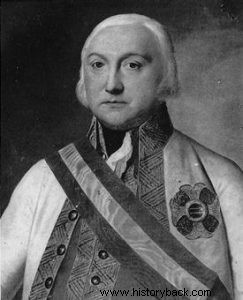
Marshal Joseph Alvinci was born in 1735 and died in 1810. He enlisted in the army at the age of 14 and fought brilliantly in the Seven Years' War. He also took part in the short War of the Bavarian Succession against the Prussians where he again distinguished himself. He fought in the Netherlands against the French. He repeated the same in Italy. He was promoted to marshal in 1808 having served 57 years in the army.
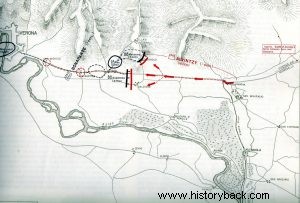
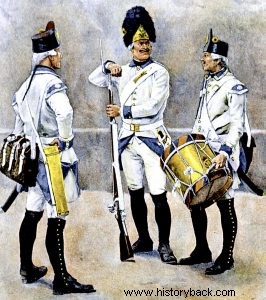
Grenadier and musicians of a German infantry regiment of the Austrian army.
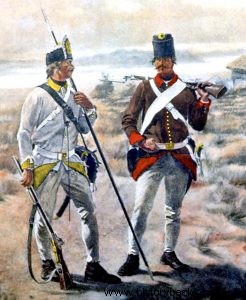
Border guards (Grezner) of the Austrian army. They also fought exceptionally well in Italy.
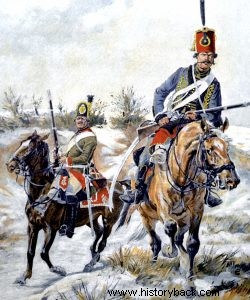
Austrian light cavalry (Sevo Leser and Hussars).
